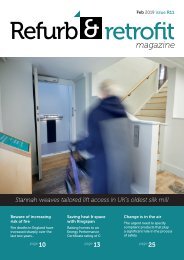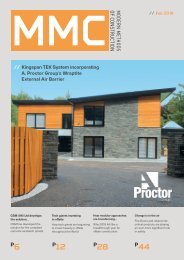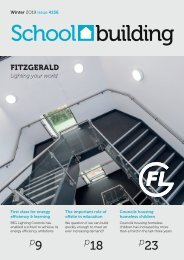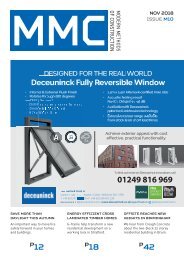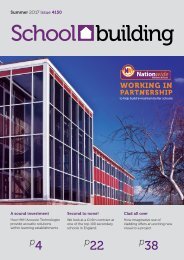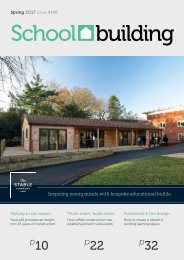R&R 8958 48 July '16 cc
Create successful ePaper yourself
Turn your PDF publications into a flip-book with our unique Google optimized e-Paper software.
News |<br />
NEWS<br />
Job flexibility ensures tradesmen are the nation’s happiest workers<br />
Over 90% of 1,000 tradespeople are happy in their jobs, with the majority putting it down to the flexibility of mobile working, new research has found.<br />
The study, which was conducted by IronmongeryDirect, found that 91% of mobile working tradesmen are happy in their jobs, with 50% of these claiming they<br />
are very happy.<br />
Tradesmen stated that flexible working (61%) and increased productivity (28%) were the biggest benefits of mobile working. In fact, a massive 98% of tradesmen<br />
said they were happy with the amount of flexibility their job provides.<br />
When asked what they enjoy most about mobile working, the majority (62%) said they liked having flexibility over the hours they work. 42% also took<br />
satisfaction in the fact they are trusted to do their job independently.<br />
Some tradesmen prefer mobile working over being confined to an office as 23% said it helps them to work better as there are fewer distractions than in an<br />
office environment, and a fifth said it ensures they don’t get caught up in office politics. In fact, 16% said mobile working helps them to work with their team<br />
more easily.<br />
The report also found that nearly four fifths of trade professionals (79%) believe that mobile working adds to productivity and improves their job performance.<br />
UK house prices soar 1751% since 1975<br />
European Referendum<br />
The UK housing market has seen a more than eighteen-fold increase<br />
(1751%) in average prices since the last time voters were asked whether<br />
Britain should stay in or out of Europe, a<strong>cc</strong>ording to research by property<br />
crowdfunding platform, Property Partner.<br />
Compared to other investments, residential property has outperformed<br />
all other asset classes including stocks and shares (increased 9.5 times<br />
since 1975) and gold (up by more than 12 times).<br />
Residential property prices in London have risen the most, rocketing by<br />
3200% - almost double the annual UK average house price growth - since<br />
the second quarter of 1975 when Prime Minister Harold Wilson put<br />
forward a referendum on what was then known as the European<br />
Economic Community (EEC) or Common Market.<br />
Today, a little more than four decades on, the average UK house price is<br />
now £198,564. Back in June 1975, house hunters were being asked to fork<br />
out on average £10,728 – today, in real terms, taking into a<strong>cc</strong>ount inflation<br />
that would have been just £99,949.<br />
NHBC reports 17% rise in new registrations in the<br />
year to April<br />
A total of 14,228 new homes were registered to be built in April – a 17 per cent<br />
rise on the same period a year ago, a<strong>cc</strong>ording to the latest figures from the<br />
NHBC.<br />
The figure consists of 11,258 from the private sector and 2,970 public sector<br />
homes, compared to 12,201 (8,988 private sector; 3,213 public sector)<br />
registrations 12 months ago.<br />
Completions were also up four per cent for the month compared to last April<br />
(10,378 in 2016; 10,005 in 2015).<br />
There were 40,399 new home registrations in the rolling quarter (February 2016<br />
– April 2016), NHBC said; a slight decrease of one per cent on last year’s figures<br />
(40,877).<br />
During these three months several regions experienced a “notable growth” in<br />
registrations, compared to 2015, including the North-east (+47%), South-east<br />
(+23%) and Yorkshire & Humberside (+18%).<br />
“April’s new home figures show that the industry enjoyed a su<strong>cc</strong>essful month,<br />
with registration numbers well ahead of this time last year,” said Mike Quinton,<br />
the NHBC’s chief executive.<br />
Councils spend millions on temporary a<strong>cc</strong>ommodation<br />
London councils spent nearly £600m on temporary a<strong>cc</strong>ommodation over the past 18 months.<br />
A 24housing Freedom of Information (FoI) request has uncovered five capital councils alone put out nearly £270m. Overall, the 31 responses reveal London<br />
Councils as spending £558,930,837 on temporary a<strong>cc</strong>ommodation – an average of £31,051,713 per month, or an average of £1,001,668 each month per council.<br />
As rents rise and the housing crisis becomes more severe, the amount spent on temporary a<strong>cc</strong>ommodation by councils is rising.<br />
Birmingham City Council comes closest to the London boroughs, with their spending hitting a handsome £11,096,508.<br />
Manchester City Council, which is facing an ever increasing homelessness crisis, spent £5,345,717 on temporary a<strong>cc</strong>ommodation and Northern Ireland’s Housing<br />
Executive forked out just over £4m.<br />
Bristol City Council’s figure sits at £4.4m, with Reading Borough Council nearing the two million pounds mark.<br />
04<br />
refurb| RENEW <strong>July</strong> / August 2O16 issue <strong>8958</strong>




